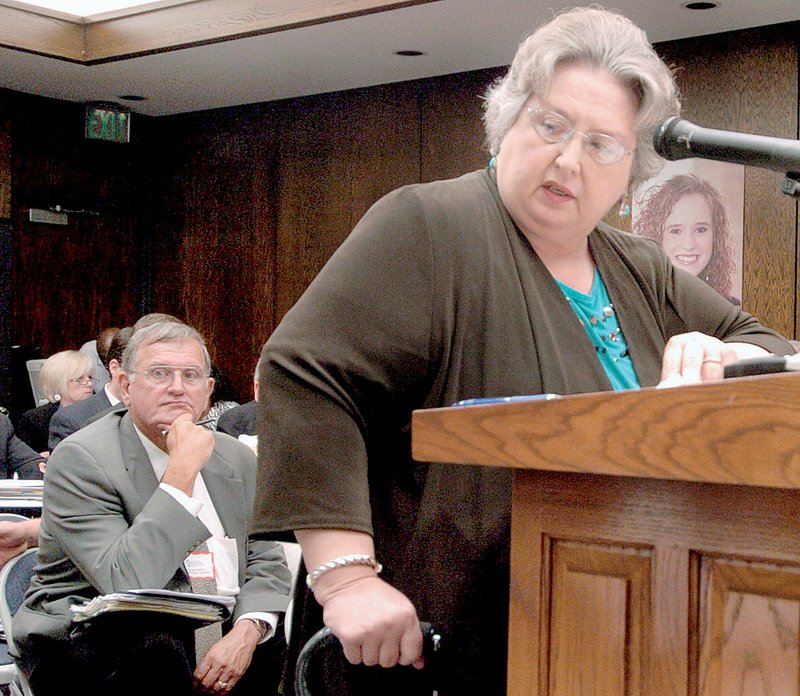LITTLE ROCK — The Arkansas Board of Education on Monday approved standards for kindergarten through-12th-grade English/ language arts and math that have already been adopted by more than 20 states, creating an unprecedented common set of standards for the nation’s public schools.
“This is exciting because it is historic,” Gayle Potter,the Arkansas Department of Education’s associate director for curriculum, assessment and research, said in presenting the standards to the board.
The adoption means changes in what and when students learn, and the creation of new state tests.
The Common Core of State Standards will not go into effect in Arkansas classrooms in the new 2010-11school year but will be implemented later on the basis of a transition plan that is now under development, Potter said.
Traditionally, each of the 50 states has developed its own set of education standards with little to no effort to coordinate with other states. Last year, however, governors and state education directors from 48 states signed on to an initiative to develop a common set of standards.
The National Governors Association’s Center for Best Practices and the Council of Chief State School Officers coordinated the effort to draft the proposed standards, pulling in groups of educators and other experts to write internationally competitive, research based standards for the states to review and adopt.
The federal government is supporting the concept of common standards, making state adoption of those standards a requirement for a state to qualify for the federal Race to the Top grants for education improvements.
Potter told Arkansas Education Board members that the common core standards are more rigorous than the existing Arkansas standards but that they encompass fewer concepts. The common core standards are designed to promote “deeper, permanent learning,” she said.
As an example, she said, the standards will call on teachers to teach mathematical fractions at the third grade instead of at the fourth and fifth grades as has been the tradition.
“That will cause trauma all over this state,” she acknowledged.
As another example, the English/language arts standards will focus on teaching three kinds of writing - persuasive, informative and narrative - and that will be done throughout a student’s school years with the greatest emphasis placed on persuasive writing. That teaching will start with children in the youngest grades.
States will be able to incorporate additional skills and concepts - about 15 percent - into the common core of standards to customize them somewhat to the state and region, Potter said.
Already a state committee of Arkansas educators has been formed to begin the transition planning for the new standards, Potter said. That effort is helped by a process developed by Achieve, a national educational policy organization, that compares a state’s current set of standards to the common core.
One of the main reasons for the delay in putting the new standards into immediate use in Arkansas is that Arkansas’ Benchmark and End-of-Course testing program is based on the existing state standards or “curriculum frameworks.”
That testing program is approved by the U.S. Department of Education in compliance with the federal No Child Left Behind Act of 2003, which calls for all students to achieve at their grade level in math and reading on state tests by the 2013-14 school year.
Potter said the states will look to the federal government for help in making the transition from one set of standards to the other.
In addition, Arkansas is part of a consortium of 26 states, led by Florida, that is developing a common testing or assessment system based on the common core standards.
That Partnership for Assessment of Readiness for College and Careers is seeking a federal Race to the Top Assessment grant of up to $350 million for developing the new tests.
Some of those exams would be summative tests, like the Benchmark and End of Course tests that come at the end of a school year, Potter said.
Other tests, not now mandated by Arkansas, would be formative or “through the course” exams that would be given periodically during the school year. Unlike existing Arkansas tests, plans for the new exams call for them to be given to students online, and not with pencil and paper, Potter said.
The state expects new tests to be piloted in the 2012-13 and 2013-14 school years before they become fully operational in the 2014-15 school year.
Failure to win the federal grant means Arkansas would have to take alternative steps to develop tests, such as developing its own tests, Education Commissioner Tom Kimbrell said.
“I’m so glad we are doing this,” Dr. Ben Mays, a state Education Board member from Clinton, told Potter about the common core of standards.
But he cautioned that the complexity of the reading material for high school students will require a reinvigorated effort to attack reading deficiencies in elementary students.
Board members Vicki Saviers of Little Rock and Sherry Burrow of Jonesboro urged that educators make an effort to get information to the public about the common core standards and make that information to the general public and to teachers “user friendly.”
Saviers noted that the way math standards are likely to require “a huge overhaul” in the way math is taught.
“Change is hard,” she said.
Potter said that teacher training on the common standards will be “ongoing for years.”
Naccaman Williams of Springdale, chairman of the Education Board and a former math teacher, applauded the common core standards for pushing the teaching of essesntial skills to earlier grades.
“Teaching fractions in third grade is great,” he said. “Kids learn more when they are younger. It’s not a matter of whether they can learn in third grade. It’s whether we can teach it.”
Front Section, Pages 1 on 07/13/2010
